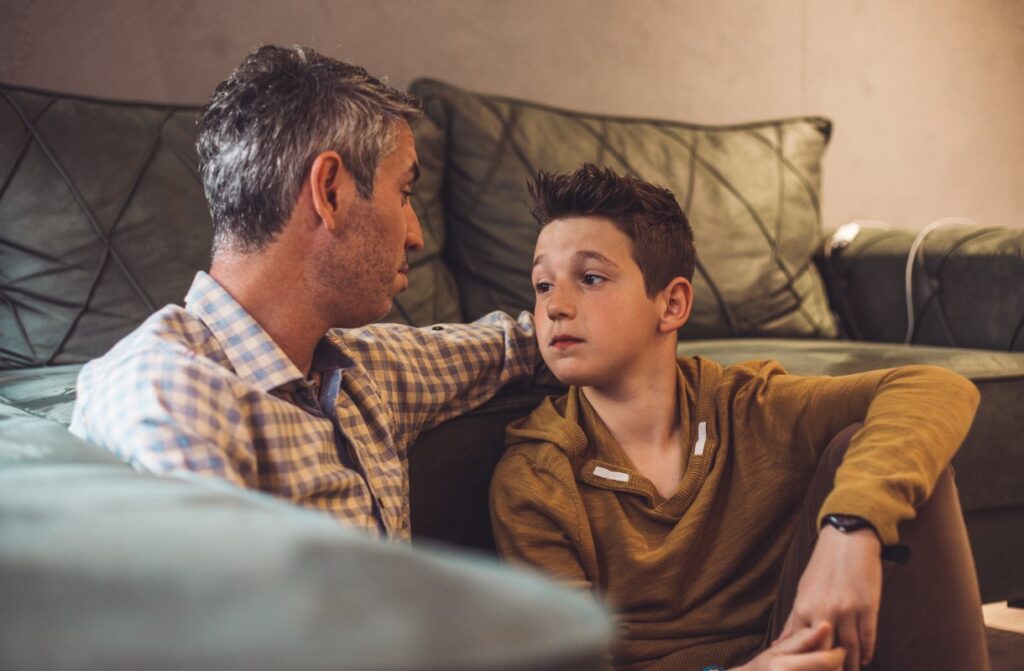Starting a Conversation about Mental Health with Your Teen Today’s teens face a wide range of mental health issues. Attention Deficit Hyperactivity Disorder (ADHD), depression, anxiety, eating disorders, and substance...
Starting a Conversation about Mental Health with Your Teen
Today’s teens face a wide range of mental health issues. Attention Deficit Hyperactivity Disorder (ADHD), depression, anxiety, eating disorders, and substance use disorders to name a few. Some teens struggle with suicidal thoughts or even make a suicide attempt. While initiating conversations about mental health isn’t easy, now more than ever it is essential.
Try these conversation starters:
“What’s the hardest thing about being you at the moment?”
This is a powerful, open-ended question. While teens may not have tremendous life experience yet, but they are experts on their lives. This question honors that expertise and allows them to share whatever they’d like. It’s an excellent launch question that can lead to more detailed mental health conversations depending on how they respond.
“I’ve noticed you’re sleeping more/spending more time alone/more fidgety than usual. I’m feeling concerned and would like to discuss it at a good time.”
When initiating a conversation about a teen’s mental health, it’s important to make statements of fact rather than voice opinions. Talk about behaviors you’ve observed. If your teen brushes you off, don’t give up right away. Bring up the topic again later. When you do find a time to talk, avoid judgment. Don’t jump into problem-solving mode. Stay connected. Listen closely. Try to understand your teen’s life and see where the conversation leads rather than attempting to steer it in one direction or another.
“I’ve felt anxious and depressed myself at times. What would it be like to talk to me or a counselor about how you’re feeling?”
Revealing your own vulnerability shows you’ve struggled with mental health challenges, but have found appropriate ways to manage them. How much you share depends on how old your teen is and the level of self-disclosure that feels right to you. Don’t assume your experience is the same as your teen’s. Everyone’s journey is different.
“When life gets too hard or stressful, some people wish they weren’t here anymore. They think about death because they just want their pain to be over. I’m wondering if you’ve ever had thoughts like that.”
If you sense your teen may be having suicidal thoughts, it’s crucial to address the issue. Do so with great sensitivity. Find a time when your teen appears calm. Spend time doing something together before diving into such deep waters. Don’t trivialize their feelings. Empathize. Make sure they understand you don’t think they’re “crazy” or there’s “something wrong with them.” Emphasize how much you love them and that you’ll do whatever is necessary to help.
What to Do If Your Teen Expresses Suicidal Thoughts
If your teen admits to experiencing suicidal ideation, don’t panic. Take some deep breaths and try to remain calm. Don’t make the conversation about your worry or upset. Rather, keep your focus on your child. Let them know how much you love them. Tell them you feel for how much pain they’re in and that you’re going to get them the help they need.
If they express resistance, explain seeking help for mental health issues isn’t a sign of weakness. Tell them that, on the contrary, it takes a lot of courage to acknowledge you’re struggling and could benefit from outside help. If your child is in immediate danger, call 911 or go to the nearest emergency department. Otherwise, seek out mental health counselors in your area or consider an accredited treatment program.
Teen Treatment at Newport Academy
At Newport Academy, we’re support teenagers and parents to navigate the tumultuous territory of adolescence. Two of our core values are compassion and love. No matter what your child is going through, our experienced professionals can help increase your teen’s self-awareness, confidence, and self-esteem. Strengthening family connections is also central to our treatment model. With the help of Attachment-Based Family Therapy, teens and their parents find healthier ways to communicate, restoring harmony to the family unit. We involve parents in their child’s treatment every step of the way.
To learn more about the family-focused approach and nationwide residential and outpatient locations visit https://www.newportacademy.com/




























